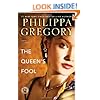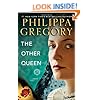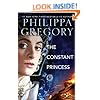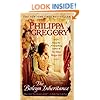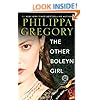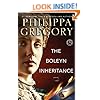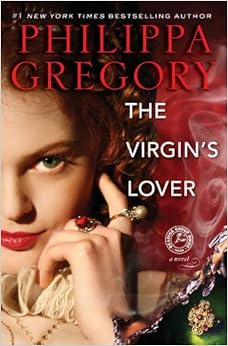
The Virgin's Lover (The Tudor Court Book 5)
and over one million other books are available for Amazon Kindle. Learn more


Flip to back
Flip to front

The Virgin's Lover (Boleyn) Paperback – September 7, 2005
See all 32 formats and editions
Hide other formats and editions
| Amazon Price | New from | Used from |
|
Hardcover, Deckle Edge
"Please retry"
|
$2.92 | $0.01 |
|
Audio CD, Abridged, Audiobook
"Please retry"
|
$4.47 | $4.00 |
|
Unknown Binding
"Please retry"
|
—
|
$10.52 | $1.49 |

$13.31
FREE Shipping on orders over $35.
In Stock.
Ships from and sold by Amazon.com.
Gift-wrap available.
NO_CONTENT_IN_FEATURE
Start reading The Virgin's Lover (The Tudor Court Book 5) on your Kindle in under a minute.
Don't have a Kindle? Get your Kindle here, or download a FREE Kindle Reading App.
Don't have a Kindle? Get your Kindle here, or download a FREE Kindle Reading App.
Best Books of the Month
Want to know our Editors' picks for the best books of the month? Browse Best Books of the Month, featuring our favorite new books in more than a dozen categories.
Want to know our Editors' picks for the best books of the month? Browse Best Books of the Month, featuring our favorite new books in more than a dozen categories.
Product Details
Would you like to update product info or give feedback on images?.
|
Editorial Reviews
From Publishers Weekly
Bestseller Gregory captivates again with this expertly crafted historical about the beautiful young Virgin Queen, portrayed as a narcissistic, neurotic home-wrecker. As in her previous novels about Tudor England (The Queen's Fool, etc.), Gregory amasses a wealth of colorful period detail to depict the shaky first days of Elizabeth I's reign. The year is 1558, an especially dangerous time for the nation: no bishop will coronate Henry VIII's Protestant daughter, the treasury is bankrupt, the army is unpaid and demoralized. Meanwhile, the French are occupying Scotland and threatening to install "that woman"—Mary, Queen of Scots—on the throne. Ignoring the matrimonial advice of pragmatic Secretary of State William Cecil, the 25-year-old Elizabeth persists in stringing along Europe's most eligible bachelors, including King Philip of Spain and the Hapsburg archduke Ferdinand. It's no secret why: she's fallen for her "dark, saturnine" master of horse, Sir Robert Dudley, whose traitorous family history and marriage to the privately Catholic Amy make him an unsuitable consort. Gregory deftly depicts this love triangle as both larger than life and all too familiar; all three characters are sympathetic without being likable, particularly the arch-mistress Elizabeth, who pouts, throws tantrums, connives and betrays with queenly impunity. After a while the plot stagnates, as the lovers flaunt their emotions in the face of repetitious arguments from Amy, Cecil and various other scandalized members of the court. But readers addicted to Gregory's intelligent, well-researched tales of intrigue and romance will be enthralled, right down to the teasingly tragic ending.
Copyright © Reed Business Information, a division of Reed Elsevier Inc. All rights reserved. --This text refers to the Hardcover edition.
Copyright © Reed Business Information, a division of Reed Elsevier Inc. All rights reserved. --This text refers to the Hardcover edition.
From Booklist
The story of Queen Elizabeth I and her court has been told countlessly in historical fiction. This third novel in a popular series following the machinations and passions of the Tudor court presents lively characters, political intrigue, and soaring emotions swirling around the early years of Elizabeth's reign. Lifelong friend Robert Dudley and Elizabeth share an ardent love affair, but the married Robert is already tainted with a traitor's brush. In addition, his wife, the devoted Amy, will never relinquish him. In tandem with her illicit liaison, Elizabeth conspires with William Cecil, her most trusted counselor, to secure the wealth of her court and country by building a secret cache of gold. The coin of the realm's new value will financially ruin Dudley. Readers already know how history unfolds but will quickly turn pages to the story's end. Elizabeth's manipulations, Dudley's allegiance, and Cecil's political plotting come together in an engaging story. The first two novels in the series were book-club favorites, and expect this one to follow suit--and expect further entries in this rousing series. Kaite Mediatore
Copyright © American Library Association. All rights reserved --This text refers to the Hardcover edition.
Copyright © American Library Association. All rights reserved --This text refers to the Hardcover edition.
More About the Author
Born in Kenya in 1954, Philippa Gregory moved to England with her family and was educated in Bristol and at the National Council for the Training of Journalists course in Cardiff. She worked as a senior reporter on the Portsmouth News, and as a journalist and producer for BBC radio.
Philippa obtained a BA degree in history at the University of Sussex in Brighton and a PhD at Edinburgh University in 18th-century literature. Her first novel, Wideacre, was written as she completed her PhD and became an instant world wide bestseller. On its publication, she became a full-time writer, and now lives with her family on a small farm in the North of England.
Her knowledge of gothic 18th century novels led to Philippa writing Wideacre, which was followed by a haunting sequel, The Favoured Child, and the delightful happy ending of the trilogy: Meridon. This novel was listed in Feminist Book Fortnight and for the Romantic Novel of the Year at the same time - one of the many instances of Philippa's work appealing to very different readers.
The trilogy was followed by The Wise Woman, a dazzling, disturbing novel of dark powers and desires set against the rich tapestry of the Reformation, and by Fallen Skies, an evocative realistic story set after the First World War. Her novel A Respectable Trade took her back to the 18th century where her knowledge of the slave trade and her home town of Bristol produced a haunting novel of slave trading and its terrible human cost. This is the only modern novel to explore the tragedies of slavery in England itself, and features a group of kidnapped African people trying to find their freedom in the elegant houses of 18th century Clifton. Gregory adapted her book for a highly acclaimed BBC television production which won the prize for drama from the Commission for Racial Equality and was shortlisted for a BAFTA for the screenplay.
Next came two of Gregory's best-loved novels, Earthly Joys and Virgin Earth, based on the true-life story of father and son John Tradescant working in the upheaval of the English Civil War. In these works Gregory pioneered the genre which has become her own: fictional biography, the true story of a real person brought to life with painstaking research and passionate verve.
The flowering of this new style was undoubtedly The Other Boleyn Girl, a runaway best-seller which stormed the US market and then went worldwide telling the story of the little-known sister to Anne Boleyn. Now published in 26 countries with more than a million copies in print in the US alone, this is becoming a classic historical novel, winning the Parker Pen Novel of the Year award 2002, and the Romantic Times fictional biography award. The Other Boleyn Girl was adapted for the BBC as a single television drama and a film is now in production starring Scarlett Johansson as Mary Boleyn, Natalie Portman as Anne Boleyn and Eric Bana as Henry VIII.
A regular contributor to newspapers and magazines, with short stories, features and reviews, Philippa is also a frequent broadcaster and a regular contestant on Round Britain Quiz for BBC Radio 4 and the Tudor expert for Channel 4's Time Team.
She lives in the North of England with her husband and two children and in addition to interests that include riding, walking, skiing and gardening (an interest born from research into the Tradescant family for her novel, Virgin Earth), she also runs a small charity building wells in school gardens in The Gambia. Fifty-six wells have been built by UK donors to date.
Philippa obtained a BA degree in history at the University of Sussex in Brighton and a PhD at Edinburgh University in 18th-century literature. Her first novel, Wideacre, was written as she completed her PhD and became an instant world wide bestseller. On its publication, she became a full-time writer, and now lives with her family on a small farm in the North of England.
Her knowledge of gothic 18th century novels led to Philippa writing Wideacre, which was followed by a haunting sequel, The Favoured Child, and the delightful happy ending of the trilogy: Meridon. This novel was listed in Feminist Book Fortnight and for the Romantic Novel of the Year at the same time - one of the many instances of Philippa's work appealing to very different readers.
The trilogy was followed by The Wise Woman, a dazzling, disturbing novel of dark powers and desires set against the rich tapestry of the Reformation, and by Fallen Skies, an evocative realistic story set after the First World War. Her novel A Respectable Trade took her back to the 18th century where her knowledge of the slave trade and her home town of Bristol produced a haunting novel of slave trading and its terrible human cost. This is the only modern novel to explore the tragedies of slavery in England itself, and features a group of kidnapped African people trying to find their freedom in the elegant houses of 18th century Clifton. Gregory adapted her book for a highly acclaimed BBC television production which won the prize for drama from the Commission for Racial Equality and was shortlisted for a BAFTA for the screenplay.
Next came two of Gregory's best-loved novels, Earthly Joys and Virgin Earth, based on the true-life story of father and son John Tradescant working in the upheaval of the English Civil War. In these works Gregory pioneered the genre which has become her own: fictional biography, the true story of a real person brought to life with painstaking research and passionate verve.
The flowering of this new style was undoubtedly The Other Boleyn Girl, a runaway best-seller which stormed the US market and then went worldwide telling the story of the little-known sister to Anne Boleyn. Now published in 26 countries with more than a million copies in print in the US alone, this is becoming a classic historical novel, winning the Parker Pen Novel of the Year award 2002, and the Romantic Times fictional biography award. The Other Boleyn Girl was adapted for the BBC as a single television drama and a film is now in production starring Scarlett Johansson as Mary Boleyn, Natalie Portman as Anne Boleyn and Eric Bana as Henry VIII.
A regular contributor to newspapers and magazines, with short stories, features and reviews, Philippa is also a frequent broadcaster and a regular contestant on Round Britain Quiz for BBC Radio 4 and the Tudor expert for Channel 4's Time Team.
She lives in the North of England with her husband and two children and in addition to interests that include riding, walking, skiing and gardening (an interest born from research into the Tradescant family for her novel, Virgin Earth), she also runs a small charity building wells in school gardens in The Gambia. Fifty-six wells have been built by UK donors to date.
Customer Reviews
Most Helpful Customer Reviews
111 of 123 people found the following review helpful
By
Michelle
on October 21, 2005
Format: Paperback
10 Comments
Sending feedback...
Don't be fooled by the cover; this book is not written on the same level as the author's similarly covered books, "The Other Bolyn Girl" and "The Queen's Fool". She has dumbed down her writing style for this book, I can only assume on a dare, to the level of pulp romance. Maybe it was meant for a 5th grade age level? Maybe this is her way of getting back at an agent who urged her to write a more romantic book? The characters are totally one dimensional; no one has any personality or motives outside of a romance novel stereotype; Elizabeth is a "giggling" blushing dimwit who "giggles" to everyone in almost every piece of dialogue. There is no description of anything or anyone, outside of the ubiquitous word "pretty". The writing is loaded with cliches, and in fact "pretty" appears in virtually every paragraph. At one point, Cecil speaks "sweetly" to Roberty Dudley. Ooooo kay. The love scenes come right out of "Top 10 phrases for romance writing" checklists. Utterly boring at best, and cringeworthy at worst. Seriously, fans of Wideacre and other Gregory books will wonder what is up the minute they begin reading. There is an inexplicable "cameo" by "The Queen's Fool" protagonist Hannah Green that goes absolutely nowhere. it is hard to imagine that this is the same author who created multi-dimensional characters in her other books. I have no idea what happened, but the writing style is markedly different, and downright horrible. If you want a book about Elizabeth that gives a romantic liason with Dudley, try "I, Elizabeth" by Rosalind Miles but steer clear of this wholly uninspired, dumbed down book.
Thank you for your feedback.
If this review is inappropriate, please let us know.
Sorry, we failed to record your vote. Please try again
63 of 70 people found the following review helpful
By
Lawyeraau
HALL OF FAMETOP 500 REVIEWERVINE VOICE on January 1, 2005
Format: Hardcover
Comment
Sending feedback...
This is romantic historical fiction at its finest, replete with an abundance of period detail. The focus of the book is the romantic triangle involving the newly crowned tempestuous Queen, Elizabeth I, her lover and Master of Horse, Sir Robert Dudley, and his long suffering wife, Amy, whose dreams of a simple life with her husband are shattered with Elizabeth's rise to the throne upon the death of her half-sister, Queen Mary.
There is also a cat and mouse game involving Elizabeth, her Secretary of State, the canny and shrewd William Cecil, and Robert Dudley, which develops as it becomes clear that Dudley has his heart on becoming King and ruling alongside Elizabeth as an equal, something that can only be accomplished through marriage to Elizabeth.
Unfortunately for Sir Robert Dudley, his wife, Amy, a secret Catholic, has no intention of divorcing him. Moreover, Elizabeth has no intention of letting Dudley rule as King rather than just being King consort, were they to someday wed. Yet, she is in a quandary, as she finds herself unable to resist Dudley's charms and can refuse him nothing. Elizabeth turns to William Cecil for help in saving her from herself. William Cecil knows all too well that marriage to a Dudley would be disastrous for England, as Dudley, being the Queen's favorite, is one of the most unpopular men at court with the other courtiers. Moreover, the Dudley family, though a powerful and ancient lineage, has a treasonous history.
What Cecil devises is diabolical but plausible. This twist in the tale is certainly an ingenious way of explaining a mysterious death, a death that has never been satisfactorily explained by historians. It is a death that certainly served to cast a pall upon Dudley's ambitions and ensured that he and Elizabeth would never wed.Read more ›
There is also a cat and mouse game involving Elizabeth, her Secretary of State, the canny and shrewd William Cecil, and Robert Dudley, which develops as it becomes clear that Dudley has his heart on becoming King and ruling alongside Elizabeth as an equal, something that can only be accomplished through marriage to Elizabeth.
Unfortunately for Sir Robert Dudley, his wife, Amy, a secret Catholic, has no intention of divorcing him. Moreover, Elizabeth has no intention of letting Dudley rule as King rather than just being King consort, were they to someday wed. Yet, she is in a quandary, as she finds herself unable to resist Dudley's charms and can refuse him nothing. Elizabeth turns to William Cecil for help in saving her from herself. William Cecil knows all too well that marriage to a Dudley would be disastrous for England, as Dudley, being the Queen's favorite, is one of the most unpopular men at court with the other courtiers. Moreover, the Dudley family, though a powerful and ancient lineage, has a treasonous history.
What Cecil devises is diabolical but plausible. This twist in the tale is certainly an ingenious way of explaining a mysterious death, a death that has never been satisfactorily explained by historians. It is a death that certainly served to cast a pall upon Dudley's ambitions and ensured that he and Elizabeth would never wed.Read more ›
Thank you for your feedback.
If this review is inappropriate, please let us know.
Sorry, we failed to record your vote. Please try again
141 of 168 people found the following review helpful
By
tregatt
on November 18, 2004
Format: Hardcover
4 Comments
Sending feedback...
Three pages into "The Virgin's Lover" and I suspected that I was onto a winner: I was right! With delicacy and ease, Philippa Gregory has once again penned another enthralling and beguiling tale, this time set during Elizabeth I's first year as queen, ably presenting all the political difficulties that the young queen and her advisors faced (at home and abroad) that first year, the forbidden love affair that developed between Elizabeth and her Master of Horse and childhood friend, Robert Dudley, and presenting us with her own idea as to how Amy Robsart, Robert's wife, died.
Robert Dudley always believed that he and his family were destined for greatness. But the past years, following the ill fated attempt to make Lady Jane Grey (the widow of Edward VI) queen and her second husband, Guilford Dudley, king, have been hard ones for the surviving Dudleys -- Robert in particular. For an ambitious man, used to power and court life, being stripped of his titles, land and wealth, has been particularly unbearable. And he is also beginning to realise that his choice of wife, the slightly older, uneducated and totally unambitious Amy Robsart, may have been a disastrous one. And then in 1558, Queen Mary dies without issue, and names her half-sister, Elizabeth as heir to the throne. For Robert, this means only one thing: his star is on the rise again. As he quickly settles into life at court again, he begins to realise that the new queen, his childhood friend, needs guidance in a great many things, guidance he is only to happy to give much to the dismay of Elizabeth's other advisors. William Cecil in particular. Cecil is at his wit's end as to how to thwart Robert's influence over the queen which seems to grow each day.Read more ›
Robert Dudley always believed that he and his family were destined for greatness. But the past years, following the ill fated attempt to make Lady Jane Grey (the widow of Edward VI) queen and her second husband, Guilford Dudley, king, have been hard ones for the surviving Dudleys -- Robert in particular. For an ambitious man, used to power and court life, being stripped of his titles, land and wealth, has been particularly unbearable. And he is also beginning to realise that his choice of wife, the slightly older, uneducated and totally unambitious Amy Robsart, may have been a disastrous one. And then in 1558, Queen Mary dies without issue, and names her half-sister, Elizabeth as heir to the throne. For Robert, this means only one thing: his star is on the rise again. As he quickly settles into life at court again, he begins to realise that the new queen, his childhood friend, needs guidance in a great many things, guidance he is only to happy to give much to the dismay of Elizabeth's other advisors. William Cecil in particular. Cecil is at his wit's end as to how to thwart Robert's influence over the queen which seems to grow each day.Read more ›
Thank you for your feedback.
If this review is inappropriate, please let us know.
Sorry, we failed to record your vote. Please try again
